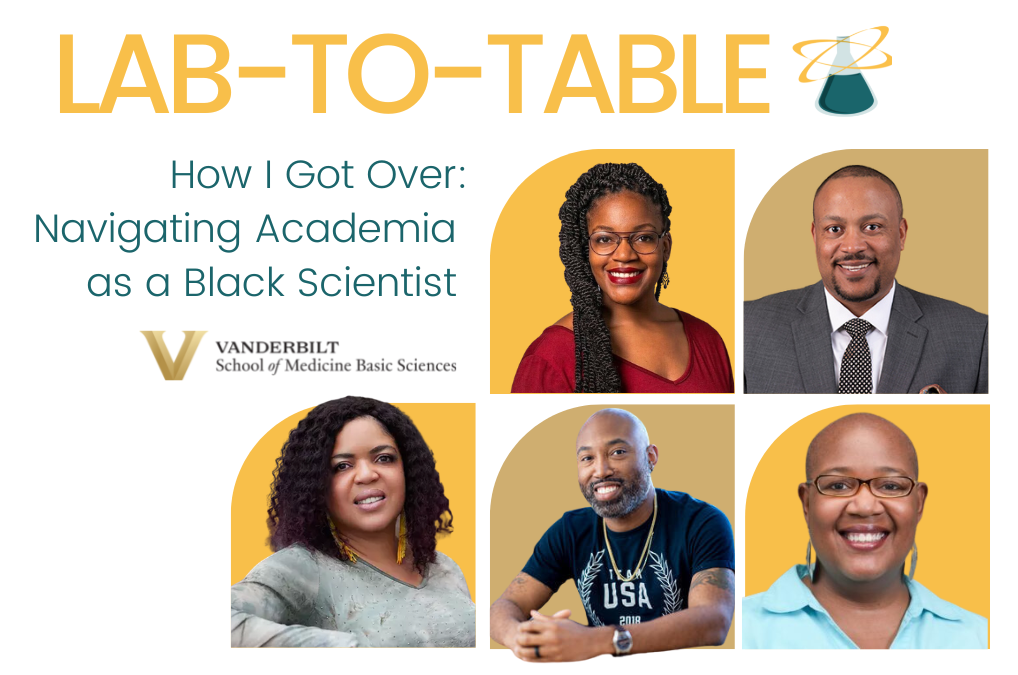
By Leah Mann
The February 27 School of Medicine Basic Sciences Lab-to-Table event, “How I Got Over: Navigating Academia as a Black Scientist,” focused on how Black scientists have overcome challenges in academia. Felysha Jenkins, assistant dean of DEI for Basic Sciences, moderated the conversation, delving into compelling questions with a panel of Black scientists that featured Lillian Brady, research instructor of pharmacology, Ebony McGee, professor of teaching and learning, Steven Townsend, Stevenson Professor of Chemistry and professor of pathology, microbiology, and immunology, and Breonte Guy, associate professor of psychological sciences at Winston-Salem State University.
How I got over
“How I got over. How I got over. You know my soul look back and wonder how I got over.”
Jenkins began the conversation by reciting the opening to Clara Ward’s 1951 Gospel hymn, “How I Got Over.” These words epitomize this year’s Black History Month theme of resistance and set the stage for a meaningful dialogue with the panelists about the obstacles they have faced in academia and the strategies they have adopted along their journeys.
When asked about the challenges they have experienced as Black scientists, Townsend noted that his major hurdle was loneliness in the field. “We can all unite around science because we’re all scientists,” he explained. “But once science is over and the conversations change, then all of a sudden, you’re back to being an outsider.”
Even before paving her own path in academia, Brady encountered a significant challenge on her way to a graduate program. She recalled being told that “I wasn’t going to get [into some programs] because I came from a Historically Black College.”
While appreciating that their stories varied, the panelists shared considerable common ground and recognized that the battle for acknowledgment and acceptance on both an academic and personal level continues. McGee acknowledged that she continues to navigate instances of self-doubt related to her ability to succeed because of her race and gender. To combat this, she has “found places and spaces that celebrate diversity, equity, and inclusion, and not places and spaces that simply tolerate it.”
Hoping to introduce more rapid change, Guy recommended that mentors of underrepresented students truly strive to understand their proteges. “Get to know them as [individuals] and what their strengths are and how they might actually leverage those strengths to do incredible work,” Guy advocated.
With the promotion of diversity and inclusivity in STEM comes the inherent task of speaking about it. These additional responsibilities usually fall on people from underrepresented groups and are undoubtedly hard to balance, but the panelists have learned to delineate their limits and rest. McGee described how her definition of self-care has developed into something much more communal and how it really hinges on the “collective agency and collective sense of responsibility as to how I flex and rest and activate and resist.”
Reflecting on their journeys and hoping to help future generations, the panelists emphasized the importance of taking care of one’s mental health and learning to work well with others. “There’s just so much help when you’re struggling that is accessible,” Townsend concluded.
This event was part of the monthly Lab-to-Table Conversations hosted through the School of Medicine Basic Sciences. To view the full conversation, you can access it via YouTube. Subscribe to receive alerts about upcoming Lab-to-Table events and get notified when we post the recordings online at our subscription center.